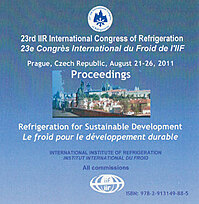
Document IIF
Implications des directives de l'Union européenne sur l'efficacité énergétique dans les supermarchés.
Energy efficiency in supermarkets: implication of EU efficiency directives.
Numéro : pap. ID: 869
Auteurs : LINDBERG U., AXELL M., ROLFSMAN L.
Résumé
At the end of 2006, the EU pledged to cut its annual use of primary energy by 20% by 2020. To achieve this goal, the EU operates at a number of levels, and with different directives, to set minimum energy efficiency standards and rules on energy labelling for products, services and infrastructure. The relevant directives apply not only to products, but also to buildings. As an example, cold chains, including supermarkets, use a lot of energy with substantial individual variations. This means that there is a considerable potential for efficiency improvement. However, to achieve the full potential it is important to have an understanding of the functional requirements and system scenarios, e.g. the overall chiller-distribution-display cabinet system. This paper discusses the impact on supermarkets of the Ecodesign of Energy-Using Products Directive and the Energy Performance of Buildings Directive. It also gives some suggestions for future work, R&D and requirements to improve the energy efficiency of supermarkets.
Documents disponibles
Format PDF
Pages : 8 p.
Disponible
Prix public
20 €
Prix membre*
Gratuit
* meilleur tarif applicable selon le type d'adhésion (voir le détail des avantages des adhésions individuelles et collectives)
Détails
- Titre original : Energy efficiency in supermarkets: implication of EU efficiency directives.
- Identifiant de la fiche : 30001690
- Langues : Anglais
- Sujet : Réglementation
- Source : Proceedings of the 23rd IIR International Congress of Refrigeration: Prague, Czech Republic, August 21-26, 2011. Overarching theme: Refrigeration for Sustainable Development.
- Date d'édition : 21/08/2011
Liens
Voir d'autres communications du même compte rendu (569)
Voir le compte rendu de la conférence
-
High energy efficiency solution for condensing ...
- Auteurs : TONIN G.
- Date : 12/06/2015
- Langues : Anglais
- Source : Le ultime tecnologie del freddo e del condizionamento. Atti del 16° Convegno Europeo: June 12-13, 2015, Milano, Italia.
- Formats : PDF
Voir la fiche
-
Supersmart: expertise hub for a market uptake o...
- Auteurs : CICONKOV S.
- Date : 06/12/2017
- Langues : Anglais
- Source : 48th International HVAC&R Congress and Exhibition.
- Formats : PDF
Voir la fiche
-
Energy analysis of a water-loop self-contained ...
- Auteurs : BAGARELLA G., LAZZARIN R., NORO M.
- Date : 23/06/2014
- Langues : Anglais
- Source : 3rd IIR International Conference on Sustainability and the Cold Chain. Proceedings: London, UK, June 23-25, 2014
- Formats : PDF
Voir la fiche
-
Ecodesign of refrigeration products.
- Auteurs : MUDGAL S., BAIN J., LIPUT M.
- Date : 29/03/2010
- Langues : Anglais
- Source : 1st IIR International Conference on Sustainability and the Cold Chain
- Formats : PDF
Voir la fiche
-
A purchaser network for increased energy effici...
- Auteurs : LINDBERG U., ALONZO Y.
- Date : 23/06/2014
- Langues : Anglais
- Source : 3rd IIR International Conference on Sustainability and the Cold Chain. Proceedings: London, UK, June 23-25, 2014
- Formats : PDF
Voir la fiche
